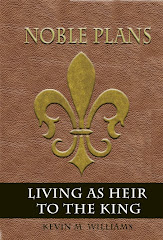If you've never seen the show, rent it. It is a powerful presentation not only of what is noble, right, and good, but of how the world-at-large wages war against the virtue of nobility.
Don Quixote, the main character, is cracked and there is no avoiding that fact. But, his dementia is such that he believes himself a valorous knight, righting wrongs, saving damsels in distress, and dispatching dragons (even when the "dragon" is only a wind mill). But what comes through time and again in the program is: Don Quixote sees good in almost everyone.
His demeanor at first alarms and then woos many to actually believe in themselves, and to have their lives transformed by this odd, but ever-so-noble man.
There are the other people in the story, however: those who are embarrassed by this nut of an uncle. They set out to bring him back to reality, to abandon this "noble nonsence" and get back to the real world. Ever know anyone like that? Life's wet blankets?
As you set out to live your noble plans, there will be those who embrace what you have to offer with a hunger and thirst. Everyone thirsts for the knowledge of Truth. Everyone is hungry to know that they can make a difference. Everyone has a spark within them that yearns for nobility.
He raises the poor from the dust, He lifts the needy from the ash heap To make them sit with nobles, And inherit a seat of honor. — 1Sa 2:8Yet there are others who feel such sentiments as noble living are an impossible dream, that they are unrealistic and absurd. Be forewarned and ready my friends. If it were impossible, then Christ never should have, never could have come. If you are of the household of faith, then you are a princess or a prince of the Most High God, and no nay-sayer can decry you. And if they do, it is only because 1) they have lost hope and desperately need your inspiration — though they will hide their starvation behind fat pride and corpulent masks or 2) they envy who and what you are and just as in number 1, they need you to feed their souls.
If your enemy is hungry, feed him; if he is thirsty, give him something to drink. In doing this, you will heap burning coals on his head. — Ro 12:20So as you go about your day-to-day routine, try being quixotic. You don't have to be a nut case, just perform random acts of kindness and beauty. And when your critics rise, bless them and realize how terribly hungry and thirsty they are.
 |
"A noble man devises noble plans; and by noble plans he stands."
– Isaiah 32:8









